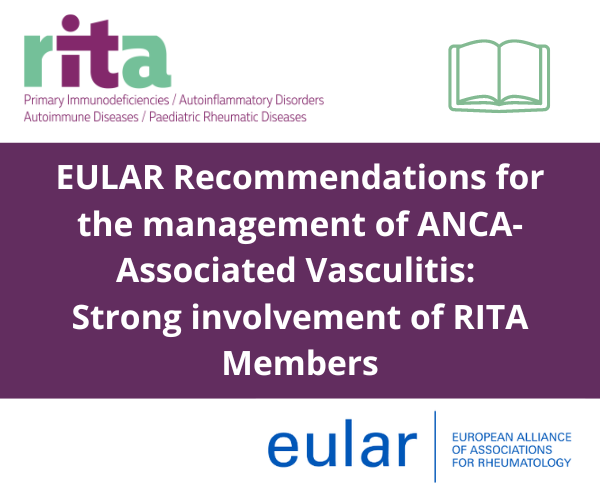The European Alliance of Associations for Rheumatology (EULAR) – has updated its recommendations on the management of people with ANCA-associated vasculitis (AAV). 8 RITA centers from 7 european countries were involved in the development of the guidelines and the project was lead by Bernhard Hellmich, from the vasculitis center at the Medius Kliniken in Kirchheim-Teck, a RITA member in Germany.
The new 2022 update includes substantial changes, including the introduction of overarching principles and new recommendations on ANCA-testing, glucocorticoid treatment, the use of agents with novel modes of action, and preventative measures against infection. In addition, new data has allowed the development of some separate recommendations for people with specific AAV subtypes –namely Granulomatosis with Polyangiitis (GPA), Microscopic Polyangiitis (MPA), and Eosinophilic Granulomatosis with Polyangiitis (EGPA). The updated EULAR recommendations were developed by a multidisciplinary task force that included rheumatologists, internists, nephrologists, and methodologists, as well as patient representatives. The information is based on evidence collected from the literature and a survey among the task force members.
The new paper developed by EULAR and published in the March 2023 issue of the Annals of the Rheumatic Diseases includes 4 overarching principles and 17 recommendations. The principles say that people with AAV should be offered best care based on shared decision making between the patient and the physician. People with AAV should have access to education so that they understand the impact of their disease, and be able to recognize key symptoms and complications. They also recommend that people with AAV be screened for treatment-related adverse effects and comorbidities, and offered appropriate preventative treatment or lifestyle advice. Finally, the overarching principles stress that AAV are rare, heterogeneous, and potentially life-and organ-threatening diseases which require multidisciplinary management that includes vasculitis experts. The individual recommendations outline the various treatment options for people to induce and maintain remission, depending on their specific diagnosis and manifestations. One additional key element of these updated recommendations is inclusion of definition of disease activity states. These can vary between different clinical trials, but EULAR recommend consensus definitions to further understanding and make it easier to compare results. This includes definitions of active disease, remission, relapse, and refractory disease.
EULAR believes that these recommendations will help to streamline the management of people with AAV – while they are not intended to be used as a one-size-fits-all strategy, and may need to be used alongside other recommendations and treatment algorithms, depending on each person’s disease, manifestations, and comorbidities. It is hoped these recommendations will be incorporated into everyday clinical practice to effectively manage AAV and to harmonize treatement approach also within the RITA network.
The strong contribution of RITA members to this guideline highlights the relevance of the RITA network for improving quality of care for patients with rare autoimmune diseases.
Reference: Hellmich B et al. EULAR recommendations for the management of ANCA-associated vasculitis: 2022 update. Ann Rheum Dis 2023 Mar 16; Epub ahead of print: [doi:10.1136/ard-2022-223764

